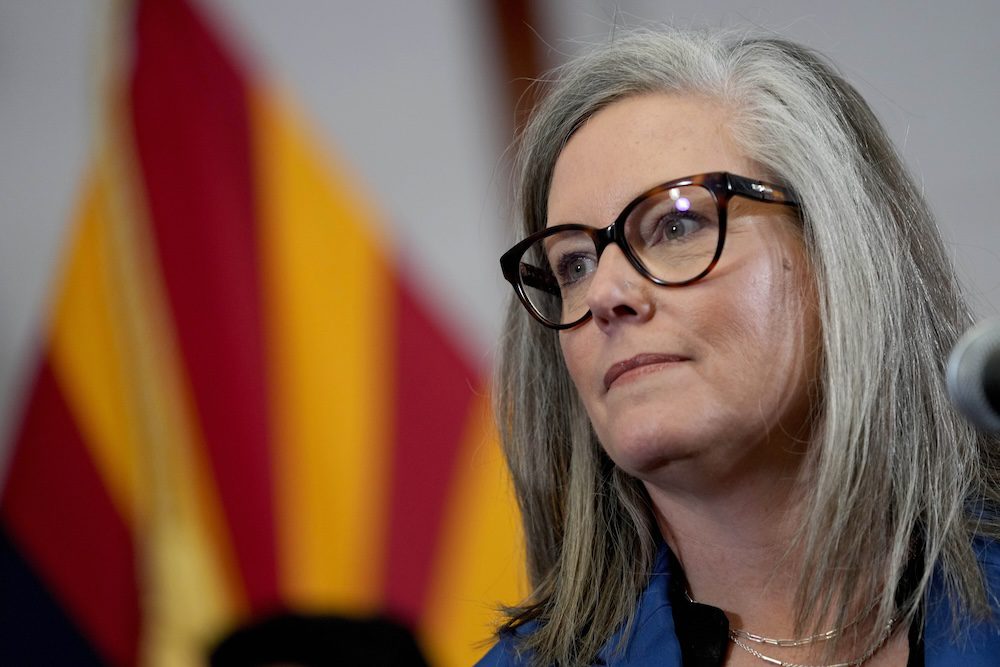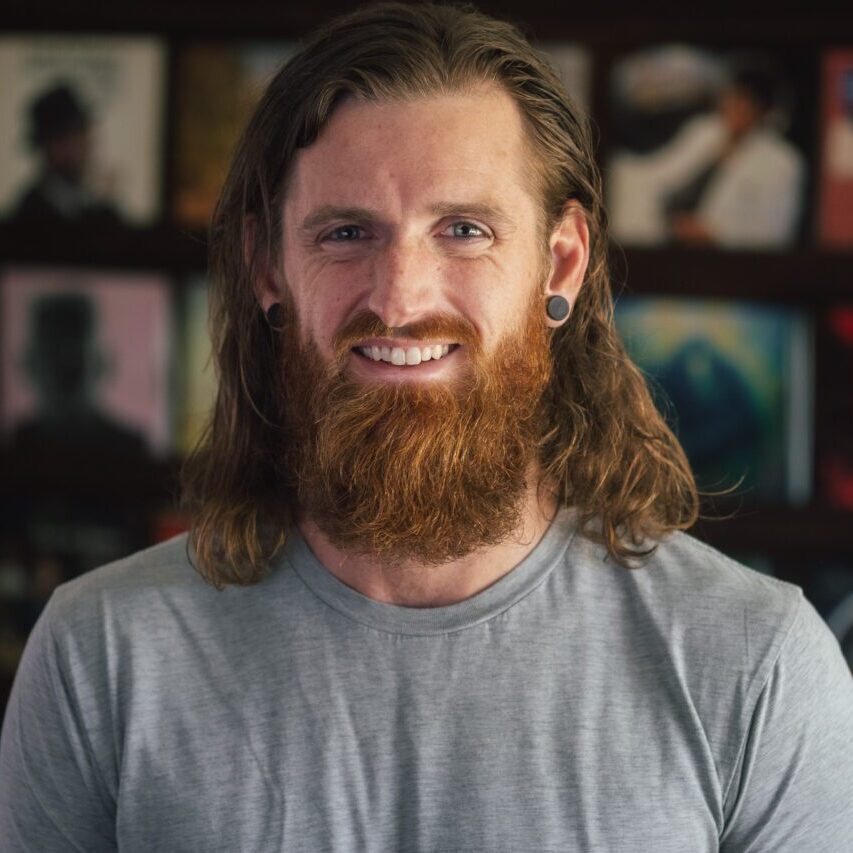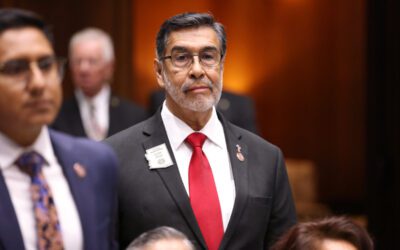
Republican candidate for US Senate Kari Lake and Rep. Paul Gosar, R-Ariz., attend the National Prayer Breakfast in the Capitol Visitor Center on Thursday, February 2, 2023. (Tom Williams/CQ-Roll Call, Inc via Getty Images)
The future of fertility care like IVF in the United States remains uncertain after Senate Republicans last month blocked legislation that would protect access to IVF and prevent it from being subjected to wrongful death lawsuits—a protection that was taken away when Roe v Wade was overturned in 2022.
Similarly, Republicans who control the US House have refused to vote on the Access to Family Building Act, which would prevent fertility care from being subject to wrongful death laws nationwide.
While Arizona’s congressional delegation has been vocally in favor of protecting IVF, their voting record reveals a partisan split. While Democrats have introduced and voted to pass bills that specifically protect fertility care, Republicans have attempted to pass multiple bills that would cause the scenario that unfolded in Alabama to take place in Arizona and all across the country.
The uncertainty began when a court decision in Alabama ruled that frozen embryos were considered children and that individuals could file wrongful death lawsuits if those embryos were destroyed, discarded, or otherwise didn’t result in a live birth. Paired with the state’s strict anti-abortion laws, which define conception as when life begins, this broad interpretation of the state’s wrongful death laws created a scenario where clinics could be sued if embryos they made for couples didn’t result in a live birth.
The Alabama Legislature passed legislation to address this, which was signed into law March 6. The ripple effect of the initial ruling still remains, however, as the absence of federal laws on the subject has left a patchwork of legal confusion for states to navigate.
In Arizona, where laws surrounding reproductive care are still in flux, reproductive rights advocates are working to enshrine abortion and conception protections into the state’s constitution. While a similar solution has worked in states like Michigan and Ohio, Congress could resolve the issue altogether should Democrats take control of the House in November.
Here’s where Arizona’s four Republican representatives who are running for reelection, along with leading Republican candidate for US Senate, Kari Lake, stand on IVF and life at conception laws that put fertilization healthcare at risk:
Kari Lake, US Senate Candidate
What she’s said: Lake has said she opposes restrictions on IVF, but also opposes protections at the federal level. This is in line with a majority of Republicans in the US Senate, who last month shot down a proposal that would have protected fertilization treatment nationwide.
Lake has also said she opposes a federal ban on abortion, but has gone back and forth regarding her support for Arizona’s total ban on abortion, which the state Supreme Court is currently deciding whether or not to reinstate. If reinstated, the ban would shift the state’s definition for when life begins to conception, in turn opening fertilization clinics up to wrongful death lawsuits.
Lake supported the total ban when she ran for governor, but has recently come out in favor of the state’s current 15-week ban. Lake’s overarching ideology, however, appears to be that states have the right to enact total bans, and she would presumably support one in Arizona, should it become law.
How she’s voted: Lake has never held public office.
Rep. David Schweikert, District 1
What he’s said: Schweikert stated his support for IVF and said he would “oppose any effort to restrict it.” He also supports a nationwide abortion ban and laws that would define life as starting at conception, which would open fertilization clinics up to wrongful death lawsuits.
How he’s voted: Schweikert cosponsored the Life at Conception Act in 2021, but did not sponsor the same bill in 2023. He also has not cosponsored the Access to Family Building Act.
Schweikert did sign on in support of a nonbinding resolution that doesn’t protect IVF legally, but calls on lawmakers like himself to oppose legislation that would restrict access to fertility treatments, like the Life at Conception Act.
Rep. Eli Crane, District 2
What he’s said: Crane has made no public statements regarding fertility treatment. He does support a nationwide abortion ban and laws that would define life as starting at conception, which would open fertilization clinics up to wrongful death lawsuits.
How he’s voted: Crane cosponsored the Life at Conception Act in 2023, and has not cosponsored the Access to Family Building Act.
Rep. Andy Biggs, District 5
What he’s said: Biggs has made no public statements regarding fertility treatment. He does support a nationwide abortion ban and laws that would define life as starting at conception, which would open fertilization clinics up to wrongful death lawsuits.
How he’s voted: Biggs cosponsored the Life at Conception Act in 2021 and again in 2023. He has not cosponsored the Access to Family Building Act.
Rep. Juan Ciscomani, District 6
What he’s said: Ciscomani signed a nonbinding resolution that doesn’t protect IVF legally, but calls on lawmakers like himself to oppose legislation that would restrict access to fertility treatments.
How he’s voted: Ciscomani has not cosponsored the Access to Family Building Act.
Rep. Paul Gosar, District 9
What he’s said: Gosar has made no public statements regarding fertility treatment. He does support a nationwide abortion ban and laws that would define life as starting at conception, which would open fertilization clinics up to wrongful death lawsuits.
How he’s voted: Biggs cosponsored the Life at Conception Act in 2021 and again in 2023. He has not cosponsored the Access to Family Building Act.
Support Our Cause
Thank you for taking the time to read our work. Before you go, we hope you'll consider supporting our values-driven journalism, which has always strived to make clear what's really at stake for Arizonans and our future.
Since day one, our goal here at The Copper Courier has always been to empower people across the state with fact-based news and information. We believe that when people are armed with knowledge about what's happening in their local, state, and federal governments—including who is working on their behalf and who is actively trying to block efforts aimed at improving the daily lives of Arizona families—they will be inspired to become civically engaged.


This OB-GYN is concerned about Arizona’s rural maternity care deserts
NEED TO KNOW: 6 Arizona counties have fewer than 1 OB-GYN per 10,000 women. Of those, Greenlee County had no obstetric care providers in the entire...

Trump administration revokes guidance requiring hospitals to provide emergency abortions
WASHINGTON (AP) — The Trump administration announced on Tuesday that it would revoke guidance to the nation's hospitals that directed them to...

House GOP fast-tracks budget bill that would cut off Medicaid funding to Planned Parenthood
The budget package proposes steep health care cuts—and includes a new push to block patients from accessing reproductive care. In a 30-24 party-line...

Bill aimed at combating postpartum depression signed into law by Gov. Katie Hobbs
Making childbirth safer and making rural reproductive health care better are the goals of a new bill in Arizona, which Gov. Katie Hobbs signed into...





